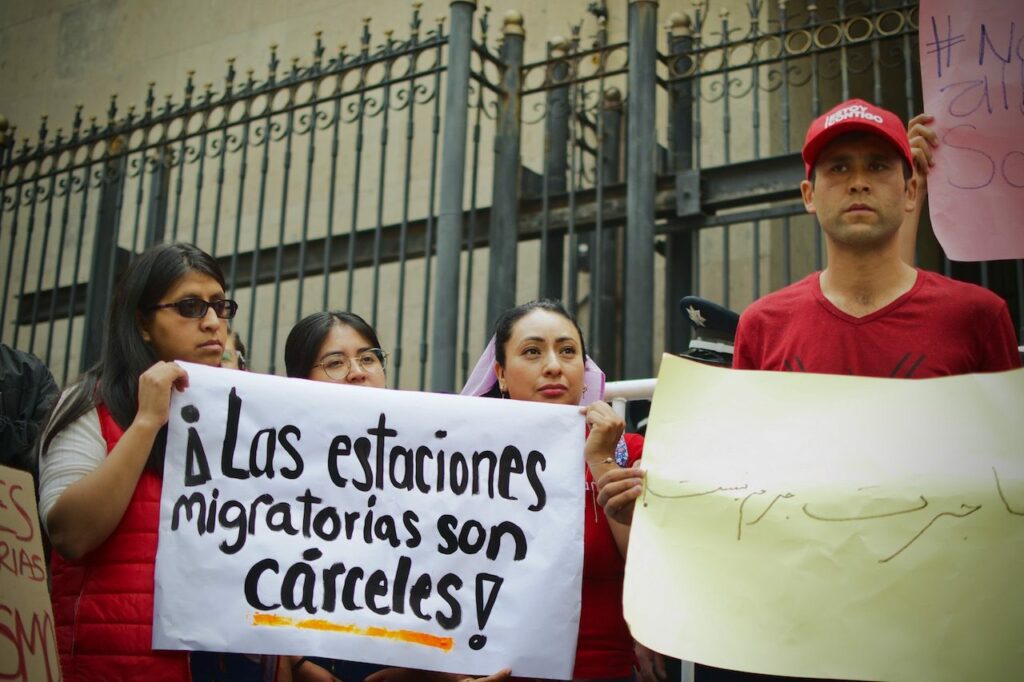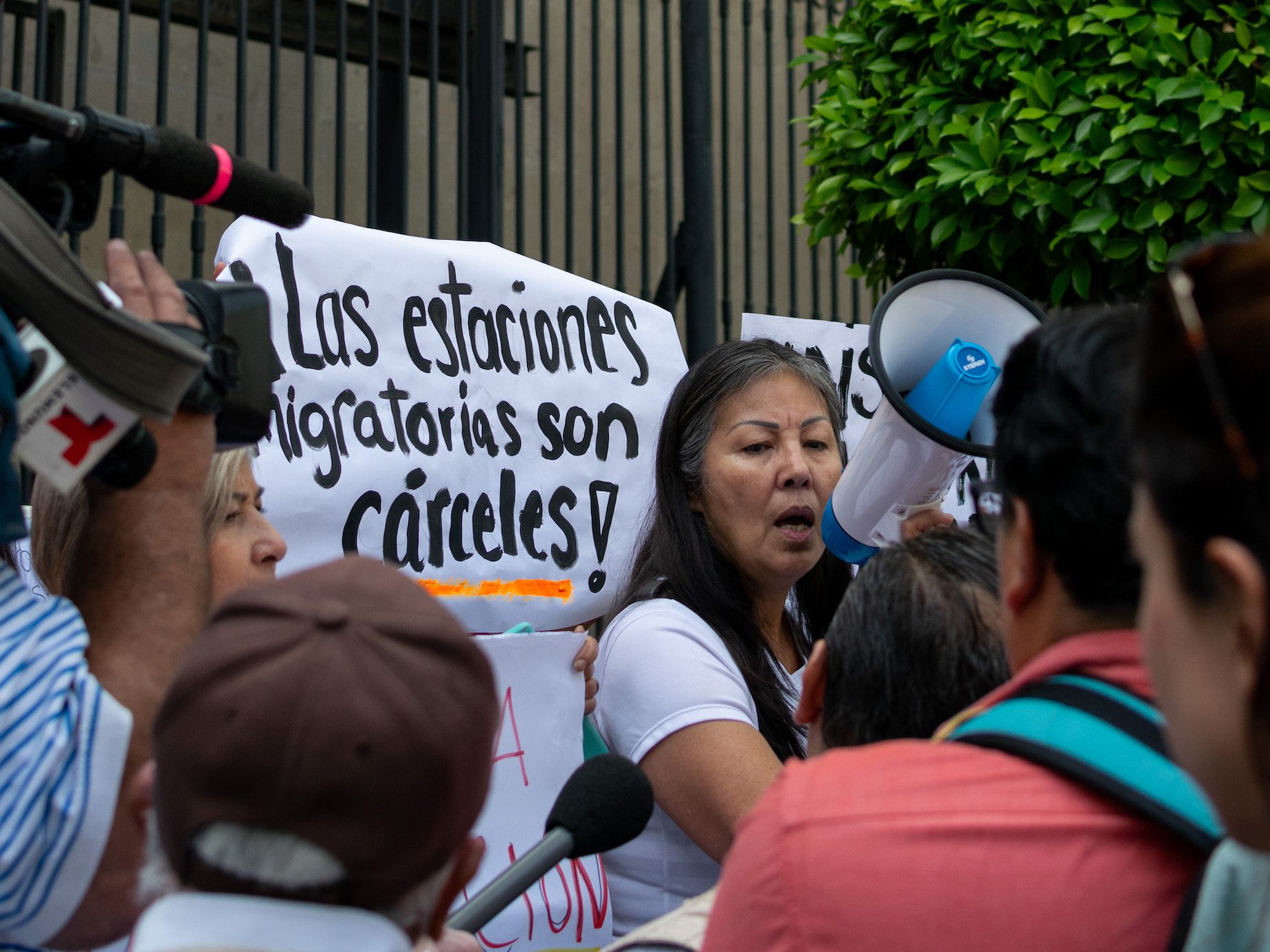In the midst of an unprecedented migratory crisis in the region, the United States and Mexico are once again having tensions over the construction of more walls on the Texas border. This is the announcement of 32 new kilometers of fencing, following the derogation of 26 federal laws in the southern part of the state.
According to statements made by President Joe Biden, the resources were allocated during Donald Trump’s administration, and he was unable to convince Congress to reallocate them to other purposes.
For July Rodríguez, director of the Mexico-based organization Apoyo a Migrantes Venezolanos, the construction of more walls and fences is an “absurd” measure that will not stop the growing migratory wave.
With more than six years dedicated to activism through legal support first to Venezuelan migrants, and then to others of different nationalities, Rodriguez estimates that the conditions for a tragedy similar to the one that happened on March 27, 2023 are still present.
On that day, a fire at a center run by the National Migration Institute (INM) in Ciudad Juarez left 40 people dead, most of them Venezuelan nationals, and exposed the flaws in Mexico’s immigration system.
Despite promises of immigration policy reform, Rodriguez reiterated in an interview with DIVERGENTES that extortion and detentions of migrants perpetrated under false pretenses by Mexican security forces persist.
Ciudad Juarez has become one of the epicenters of the migration crisis in Mexico, with the closure of plants and rail transport routes. On your recent visit, what is your assessment of the situation in this area?
We saw two scenarios this week. A good percentage of people of different nationalities, especially Venezuelans, told us they were tired of running, of persecution by the various Mexican authorities and of extortion. There is a generalized feeling of crossing at all costs and turning themselves in, even if this means immediate deportation.
During our visit, we noted the arrival of trucks with barbed wire to reinforce the border gates. The situation is critical, and the causes of migration have not been addressed.
This Thursday, one of the most controversial works of former President Donald Trump, took relevance again with President Joe Biden, by leaving 26 federal laws without effect, which will allow the Government to build 32 kilometers of fence in South Texas to contain the migratory flow. What is your position as a representative of an organization that helps migrants?
Building more walls and fences at a time like this seems absurd to us. Cities like El Paso and Ciudad Juarez have historically been a crossroads for migrants.
It is hard for us to understand how a country that is built by migrants can be so radical towards people who are looking for better life quality. This type of measure confirms that there is very little interest in solving the underlying problems in the migrants’ countries of origin.

Mexico is the spearhead, but thousands of migrants, mostly from Venezuela, remain stranded in other Central American countries. How much responsibility do these other countries, such as Nicaragua, where they are going through hell as they pass through, have in this regional migration crisis?
What is happening in the region is terrible. None of the countries are taking actions that correspond to an orderly, safe and regular migration. The governments of the region are not thinking about how to comprehensively solve the situation. There are no proposals, because there is no leadership either. Proof of this are the democratic crises in Venezuela and Nicaragua, which have not been solved either.
The region is doing nothing. Governments are left with how to minimize, how to contain. This crisis cannot be solved with more migratory stations in some transit countries, as some governments propose. The evidence shows us that these centers are, in the end, prisons for migrants that always end in tragedies.
After tragedies like the one that happened in March of this year, when 40 migrants died in a fire at a National Migration Institute center in Ciudad Juarez, President Andres Manuel Lopez Obrador promised to reform the INM and also the policies for migrants in Mexico. What has happened since then?
There is a before and after. Indeed, after the Juarez tragedy, many temporary migrant shelters were closed, because they followed the recommendations of the National Human Rights Commission (CNDH). However, other migrant stations located in Las Agujas, Villahermosa and Acayucan Este, continue to operate.
But not only that, Mexican immigration authorities continue to bring migrants to these stations under false pretenses. They tell them: ‘come on, we are going to help you, we are going to solve your situation’, and it turns out that when they arrive, they put them in the vans to take them to immigration stations, take their cell phones and in many cases, they let them go free with an order to leave by land to Guatemala. People are surprised, because they are with no communication, and basically detained.
Is the stage still set for another catastrophe to occur?
Yes, absolutely. Incommunicado detention, division, disuniting families in these detention centers continues. The priority continues to be the inhumane treatment of migrants by the authorities.
Many changes are projected for 2024. Mexico and the United States, two important countries in terms of immigration, will elect a new head of state. Do you feel that there will be a continuity of what we have seen, an iron fist, or more humanitarian policies?
The scenario is one of total uncertainty. We have realized that, with these political scenarios in both countries, there is no political interest in solving the immigration issue. We are already seeing it in Mexico. If there was a political interest in solving things, the Juarez tragedy would not have happened.
The Mexican government is not taking immediate action, they are not looking for spaces for migrants to arrive to request information or any appointment. They continue to detain them and take them to immigration stations to give them orders to leave the country.





